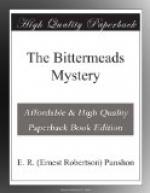Clive made another rush that a somewhat prickly bush very effectually stopped.
“You—who are you—where—what—how dare you?” he gasped as he picked himself up and tried to disentangle himself from the prickles.
“Don’t make such a row,” said Dunn from a new direction. “Do you want to raise the whole neighbourhood? Haven’t you played the fool enough? If you want to commit suicide, why can’t you cut your throat quietly and decently at home, instead of coming alone to the garden at Bittermeads at night?”
There was a note of sombre and intense conviction in his voice that penetrated even the excited mind of the raging Clive.
“What do you mean?” he asked, and then:
“Who are you?”
“Never mind who I am,” answered Dunn. “And I mean just what I say. You might as well commit suicide out of hand as come fooling about here alone at night.”
“You’re crazy, you’re talking rubbish!” Clive exclaimed.
“I’m neither crazy nor talking rubbish,” answered Dunn. “But if you persist in making such a row I shall take myself off and leave you to see the thing through by yourself and get yourself knocked on the head any way you like best.”
“Oh, I’m beginning to understand,” said Clive. “I suppose you’re one of my poaching friends—are you? Look here, if you know who it was who attacked me the other night you can earn fifty pounds any time you like.”
“Your poaching friends, as you call them,” answered Dunn, “are most likely only anxious to keep out of your way. This has nothing to do with them.”
“Well, come nearer and let me see you,” Clive said. “You needn’t be afraid. You can’t expect me to take any notice of some one I can’t see, talking rubbish in the dark.”
“I don’t much care whether you take any notice or not,” answered Dunn. “You can go your own silly way if you like, it’s nothing to me. I’ve warned you, and if you care to listen I’ll make my warning a little clearer. And one thing I will tell you—one man already has left this house hidden in a packing-case with a bullet through his brain, and I will ask you a question: ‘How did your father die?’”
“He was killed in a motor-car accident,” answered Clive hesitatingly, as though not certain whether to continue this strange and puzzling conversation or break it off.
“There are many accidents,” said Dunn. “And that may have been one, for all I know, or it may not. Well, I’ve warned you. I had to do that. You’ll probably go on acting like a fool and believing that nowadays murders don’t happen, but if you’re wise, you’ll go home to bed and run no more silly risks.”
“Of course I’m not going to pay the least attention,” began Clive, when Dunn interrupted him sharply.
“Hush! hush!” he said sharply. “Crouch down: don’t make a sound, don’t stir or move. Hush!”
For Dunn’s sharp ear had caught the sound of approaching footsteps that were drawing quickly nearer, and almost instantly he guessed who it would be, for there were few pedestrians who came along that lonely road so late at night.




